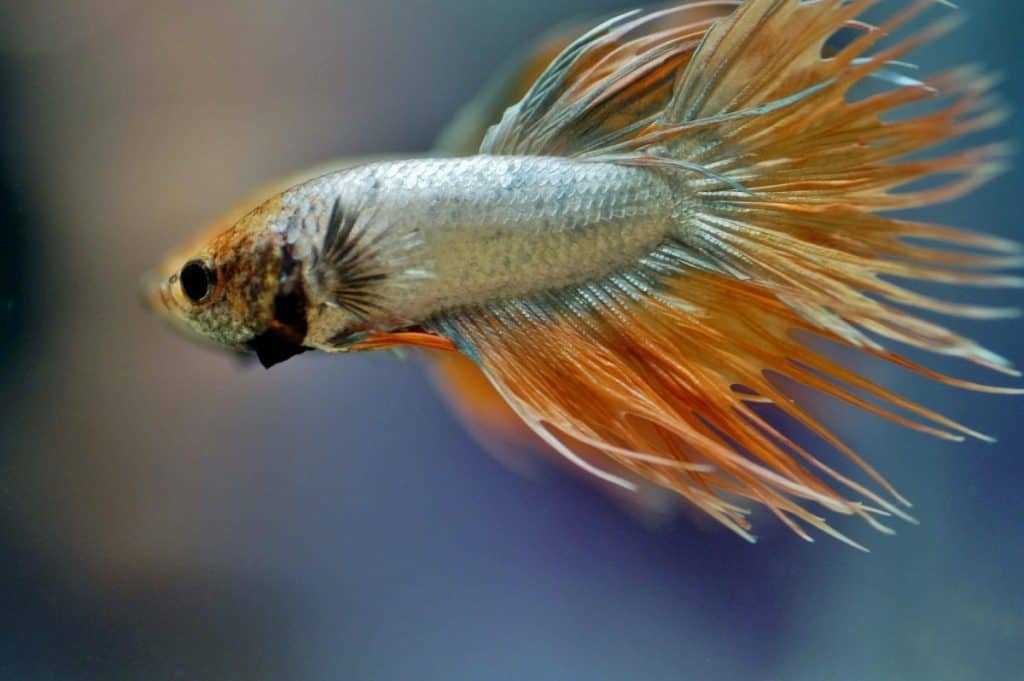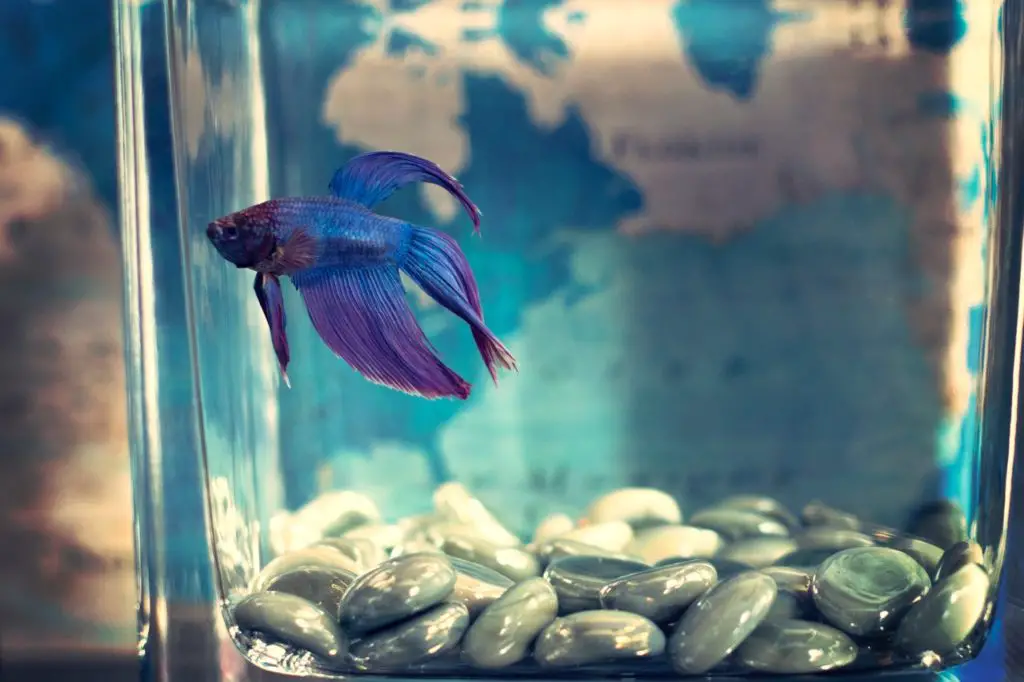Knowing how long betta fish can go without food is essential for fish keepers. Betta fish have a reputation for being hardy and easy to care for, but they need to do better when their food supply is interrupted. In the wild, betta fish hunt for prey almost daily and must eat regularly to survive. Knowing how much food your betta needs is essential for providing them with the best care possible.
- How Long Can Betta Fish Survive without Food?
- Can I Skip Days when Feeding My Betta?
- How Long Can Betta Fish Fry Go without Food?
- How Often Do You Feed a Betta Fish?
- Can I Leave My Betta Alone While on Vacation?
- Should You Use an Automatic Fish Feeder or Ask a Neighbor?
- What Is the Diet of A Betta Fish?
- How Much Should I Be Feeding My Betta?
- Best Practices when Leaving Your Betta Alone
- Conclusion
How Long Can Betta Fish Survive without Food?
Determining how long can a betta fish go without food is an essential consideration for any betta owner. Bettas can survive 10-14 days without food. However, the exact time your betta can go without eating will depend on various factors such as age, health, and water temperature. Additionally, overfeeding and underfeeding can impact how long your betta can survive without food. Therefore it is essential to monitor your betta’s diet closely and feed the appropriate amount of food to ensure they remain healthy and strong. It is also important to note that while bettas can technically survive up to 10 to 14 days without food, this should not be considered a license to starve them regularly. To keep your betta happy and healthy, you should provide them regular meals throughout the week.

Can I Skip Days when Feeding My Betta?
It is perfectly safe to skip days when feeding your betta. Experts recommend implementing “fasting days” into their diets as part of their routine. If you decide to fast your fish one day every week, then make sure that you resume regular feeding habits on the other days; otherwise, this will put too much strain on their internal organs. Fasting days are beneficial because they help reset digestion cycles which helps keep harmful bacteria at bay while also giving your pet time to rest.
How Long Can Betta Fish Fry Go without Food?
Betta fish are hardy creatures and can survive for an extended period without food. Generally, betta fish fry can go for three days without food before becoming malnourished. However, providing them with enough nutrition ensures their health and vitality. To safeguard your betta fish fry has enough food, you should invest in an automatic feeder that dispenses food regularly. This eliminates the need for you to feed them manually every few days and allows the betta fish fry to receive a steady supply of nutrition. Although betta fish fry can go for up to three days without food, it does not mean they should, and it is essential to understand that their health will suffer if they do not receive consistent nutrition over an extended period.
How Often Do You Feed a Betta Fish?
Bettas are generally slow eaters who need small meals throughout the day rather than one big meal daily. Feeding them two or three times per day (in the morning, afternoon, and evening) is ideal for maintaining a healthy appetite without overfeeding them. Bettas have tiny stomachs and can only eat a little food at a time, so it’s crucial to ensure they don’t keep eating as long as they want. Overfeeding can be unhealthy for your betta and can cause bloating, which can be damaging to the fish’s health. It is vital to ensure that your betta fish gets enough nutrition from their diet, but it is also essential not to overfeed them. An excellent way to ensure this is by monitoring their food intake and not allowing them to eat more than two meals daily. This will help keep your betta fish healthy and ensure they get the proper nutrients from their diet. Following these guidelines, you can ensure your betta fish receives the nutrients they need without overfeeding them too much food.
Some people even choose to fast their bettas one day a week to give their digestive systems a break from processing all that food! If you do decide to fast them periodically, monitor their health closely so that you can intervene if something goes wrong (such as weight loss).
Can I Leave My Betta Alone While on Vacation?
Leaving your betta fish is usually safe if you take a short break (two days or less). Make sure there’s an adequate food supply in the tank before you go! However, if you’re planning on traveling for longer than that, then it’s best to arrange for someone else, a friend or family member, to look after your fish while you’re away. Make sure they know what to do to keep your fish healthy; if necessary, provide detailed instructions so there’s clarity about how often You should feed the fish or what types of foods are preferred by your particular breed. Another option is to use an automatic fish feeder if there is no one else to care for your aquarium fish.
Should You Use an Automatic Fish Feeder or Ask a Neighbor?
An automatic fish feeder is a great way to ensure your betta fish regularly gets the nutrition it needs. Automatic fish feeders can help you provide a consistent diet while ensuring that your bettas are well-rested and underfed. They can also be helpful if you have to leave town for a few days and want to avoid asking a neighbor to feed your betta fish. Many models come with adjustable settings, so you can customize them to meet your particular fish species‘ needs. Some even have timers and sensors alerting when it’s time for food or when the tank needs cleaning. If you’re looking for an easy way to ensure that your bettas stay healthy and well-fed, then an automatic fish feeder is worth considering.
It also takes the burden off of you and ensures that your bettas will not go hungry if you forget to feed them. However, if you don’t feel comfortable relying solely on an automatic fish feeder, asking a neighbor to help is another option. This way, your bettas get the nutrition they need and give someone else a chance to interact with and care for your beloved fish. Ultimately, it’s up to you which approach works best for you and your betta’s needs.
What Is the Diet of A Betta Fish?
Bettas are carnivorous omnivores that primarily eat live food in the wild. However, in the home aquarium setting, they will accept frozen and freeze-dried foods such as brine shrimp, daphnia, krill, bloodworms, and tubifex worms. They may even take pellets or flakes explicitly formulated for bettas. It is crucial to provide a variety of foods to ensure that your betta receives all of its essential nutrients. By providing your betta with a well-balanced diet, you can ensure they remain healthy and active for years to come!

How Much Should I Be Feeding My Betta?
The amount of food you give your betta depends on size and activity level. A good rule of thumb is to feed them no more than they can eat in three minutes, or they may become bloated and have difficulty digesting the excess fish food. It’s also important to vary their diet by offering live and frozen foods such as brine shrimp, bloodworms, and daphnia. You can also supplement your diet with high-quality pellets or flakes.
Best Practices when Leaving Your Betta Alone
- 1. Clean the tank before leaving your fish: Make sure to thoroughly clean your betta’s tank before you go so that there is no debris and pollutants in the water. This will help keep your fish healthy while you are away.
- 2. Set up a routine feeding schedule: Setting up an automatic feeder or having someone come in to feed your fish regularly can help ensure that your betta gets the nutrition it needs while you’re gone.
- 3. Check water quality regularly: Have someone check the water quality regularly while you’re away, such as pH and ammonia levels, to ensure your fish has clean and safe water to swim in.
- 4. Change some of the water: Have someone change some of it periodically while you are gone so that it stays fresh and free from toxins and pollutants.
- 5. Provide plenty of hiding places: Make sure there are plenty of places for your betta to hide and explore while you’re away, such as plants, rocks, or decorations that provide shade and shelter from potential predators.
- 6. Keep tank temperature stable: Make sure the tank temperature is maintained at a stable level using a heater or other temperature-regulating device. Betta fish prefer warmer waters (around 78-80 degrees Fahrenheit), which will help keep them comfortable during your absence.
Conclusion
In conclusion, this article has helped you understand how long betta fish can survive without food. While it is perfectly safe for them to skip meals occasionally or even go through short periods between meals – it shouldn’t become a regular habit due to the potential health risks involved. Always ensure that you provide them with healthy meals according to their dietary needs and monitor them closely so that they are getting enough nutrition!



